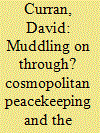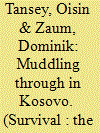| Srl | Item |
| 1 |
ID:
151524


|
|
|
|
|
| Summary/Abstract |
This article analyses direct forms of the ‘protection of civilians’ (PoC) in United Nations (UN) peacekeeping, and how this links to aspirations outlined by cosmopolitan scholarship at the turn of the twentieth century. Its main contention is that cosmopolitan conceptions of peacekeeping, which advocate more active forms of civilian protection, have faced significant challenges in the UN peacekeeping system. These challenges (internal and external) are a result of the state-based nature of the UN, and its peacekeeping practice. Therefore, the UN’s flexibility to adopt ethical practices associated with PoC can only be contained within confined boundaries. The article takes as its starting point the aspirations of cosmopolitan scholarship before outlining policy development in UN peacekeeping concerning PoC. It then explores internal and external challenges faced in operationalizing PoC in UN peacekeeping practice before arguing that the UN may be at a stage where it is ‘muddling through’ in terms of PoC. The article contributes to debates about the role of peacekeeping in global politics, through seeking to understand the possible limits of cosmopolitanism within peacekeeping practice. Moreover, it offers a contemporary understanding of where the UN has developed PoC in its deployments and what challenges remain.
|
|
|
|
|
|
|
|
|
|
|
|
|
|
|
|
| 2 |
ID:
086164


|
|
|
|
|
| Publication |
2009.
|
| Summary/Abstract |
Kosovo's unilateral declaration of independence of 17 February 2008 has made visible the deep divisions between the United States and its European allies on the one hand, and Russia on the other; divisions that shaped the political dynamics of the Kosovo crisis nine years ago as they do today. The failure to settle the status question through diplomacy has thrown the UN into crisis, leaving the Security Council deadlocked and the international community in Kosovo without direction and momentum. It has led to the de facto partition of Kosovo and control by Belgrade of the Serb-inhabited northern municipalities, and left the international community struggling to define the nature of its engagement. The political divisions that have heightened the problem in Kosovo over the last nine years are unlikely to be resolved soon and, if anything, recent developments have accentuated them. New and creative approaches to stabilising Kosovo and promoting its economic and institutional development are necessary. Current European Union projects in support of the peace process in Northern Ireland might offer a model for such engagement.
|
|
|
|
|
|
|
|
|
|
|
|
|
|
|
|